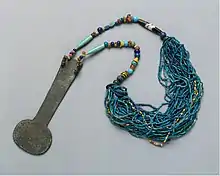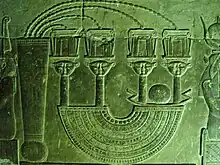

In ancient Egyptian religion, a menat (Ancient Egyptian: mnj.t, Arabic: منات) was a type of artefact closely associated with the goddess Hathor.[1][2]
Operation
The menat was held in the hand by its counterpoise and used as a rattle by Hathor's priestesses.[3][4] It was also worn as a protective amulet, particularly by Apis bulls.[5]
Parts
The menat typically included an aegis attached to beaded strings. The other ends of the strings were tied to a counterweight that dangled on the wearer's back.[6] The aegis was often made of faience, but other materials such as leather and bronze were also used.[7] It was often inscribed or bore depictions of deities associated with Hathor.
Purpose
The necklace was meant to ensure good luck and fortune and to protect against evil spirits. It was also worn for protection in the afterlife and is often found buried with the dead, given as a grave gift since Ramesside times .[8] It was expected to foster fruitfulness and good health for women, and for men it signified virility.[9]
Footnotes
References
- Robert A. Armour, Gods and Myths of Ancient Egypt, American Univ. in Cairo Press 2001
- George Hart, The Routledge Dictionary Of Egyptian Gods And Goddesses, Routledge 2005
- Manfres Lurker, Lexikon der Götter und Symbole der alten Ägypter, Scherz 1974
- Robert Steven Bianchi, Daily Life of the Nubians, Greenwood Press 2004
- Wendy Doniger, Merriam-Webster's Encyclopedia of World Religions, Merriam-Webster 1999
- Karel van der Toorn, Pieter Willem van der Horst, Bob Becking, Wm. B. Eerdmans, Dictionary of Deities and Demons in the Bible, Wm. B. Eerdmans Publishing 1999
- Erman, Johann Peter Adolf, and Hermann Grapow, eds. 1926–1953. Wörterbuch der aegyptischen Sprache im Auftrage der deutschen Akademien. 6 vols. Leipzig: J. C. Hinrichs’schen Buchhandlungen. (Reprinted Berlin: Akademie-Verlag GmbH, 1971).
External links
![]() Media related to Menat-necklace and counterpoise at Wikimedia Commons
Media related to Menat-necklace and counterpoise at Wikimedia Commons
